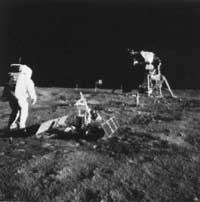Gift of Apollo
Apollo 11 was followed by six other missions. Everyone, except one, got to sit on the surface of the Moon. Apollo 17 led the first scientist. As soon as the program approached it was suspended. The first scientist who came to the Moon was the same person and the last friend he had left. The program fulfilled its goal that night of July 1969. The six missions followed from behind were only inertia.
Apollo's goal was not primarily science, nor space. Behind Apollo was ideological conflict and nuclear war (euphemisms such as world leadership and national prestige were often used). However, space science worked well. Now we know much more about the composition of the Moon and how to complete the landscape. We have made great strides in understanding the appearance of the Moon.

Some of us have used the intense statistics of lunar craters to act on the appearance of Earth. However, much more important than that was: That Apollo offered protection, umbrella, to the brilliant automatic spaces that were dispersed by the Solar System. Thus, although unconsciously, the first study of dozens of new worlds was conducted. The children of Apollo have reached the limits of the Solar System.
If there had been no Appoles (not even the political objective it served), I have serious doubts as to whether the US would have done the same to explore the Solar System. Mariner, Viking, Voyager, Magallaes, Galileo and Cassini are gifts of Apollo. Something similar can be said of Soviet work in the exploration of the Solar System, especially of the first soft landings on other worlds (Luna 9, Martitz 3 and Venera 8).
Apollo surprised the imagination of the world by giving him confidence, enthusiasm and broad visions. That was one of his destinations. Incorporate technological optimism and illusion of the future. If we could go to the moon, how far can we get? Even among America's non-admirers, regardless of the reason behind the project, it was recognized that the nation achieved greatness with Apollo.
* Translated by Inaki Irazabalbeitia





